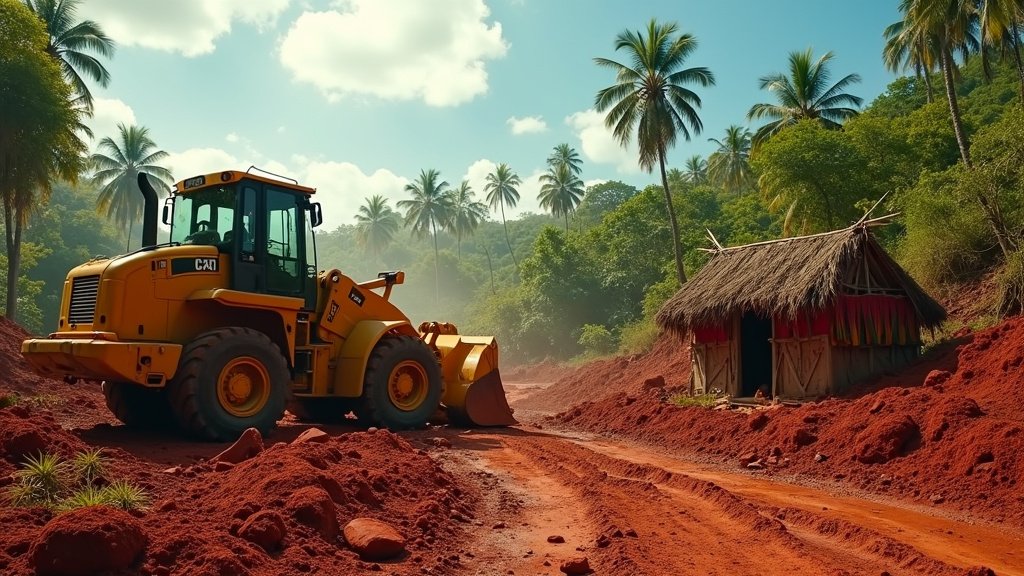In a profound blow to cultural heritage and environmental preservation, the Rastafari Indigenous Village, nestled in the serene Montego Bay Gardens, Portobello, Jamaica, is currently enduring what its proponents describe as a “Time of Trial.” This critical period of upheaval stems directly from extensive road construction activities spearheaded by the China Harbour Engineering Company (CHEC), a development project that has raised serious questions about the nation’s priorities.
The repercussions of this ambitious infrastructure undertaking are far-reaching and devastating. The landscape surrounding the village has suffered substantial damage, marked by widespread deforestation and dramatically altered topographical features. What was once a vibrant, natural sanctuary, integral to the spiritual and cultural life of the Rastafarian community, has been irrevocably scarred. This destruction is not merely environmental; it represents a direct assault on the cultural heritage embedded within the land itself, profoundly impacting the identity not only of Rastafarians but also of all Jamaicans who value their rich history and unique traditions.
The Cost of “Cult of Development”
Critics are increasingly vocal in their condemnation, framing the current situation as a symptom of Jamaica’s overarching “Cult of Development.” This term encapsulates a national mindset perceived to prioritize large-scale infrastructure projects above all else, often at the expense of sustainable growth, environmental stewardship, and the preservation of irreplaceable cultural sites. The ongoing predicament at the Rastafari Indigenous Village serves as a stark illustration of this imbalance, igniting a crucial debate about whether progress should necessitate such profound sacrifice.
The core of the critique lies in the perceived lack of foresight and sensitivity shown towards the intrinsic value of natural and cultural landscapes. While infrastructure development is vital for national advancement, the methods employed by entities like CHEC, and the oversight provided by local authorities, are being scrutinized for their apparent disregard for the delicate ecosystems and cultural tapestries that define regions like Montego Bay Gardens. This approach, many argue, undermines the very fabric of the Jamaican nation and its diverse peoples.
Access Denied: A Village Effectively Closed
One of the most immediate and tangible consequences of the construction has been the severe disruption to access. The once-welcoming paths to the Rastafari Indigenous Village have become virtually impassable, rendering visits extremely challenging. For all practical purposes, this cherished cultural haven is now effectively closed to visitors and, perhaps more tragically, to the very community it represents. This isolation not only stifles the village’s ability to share its rich culture but also cuts off a vital source of livelihood and connection for its residents.
The challenge of access symbolizes a deeper metaphorical closure. It speaks to a growing disconnect between ambitious national development goals and the grassroots realities of local communities. The inability for people to reach the village underscores a broader issue of visibility and recognition for indigenous groups within the national development narrative. The village, once a beacon of Rastafarian life and a significant tourist attraction, now stands as a somber monument to the unintended, yet deeply felt, consequences of unchecked development.
A Broader Call for Reflection
The unfolding events at the Rastafari Indigenous Village are more than just a local news story; they serve as a powerful cautionary tale for Jamaica and other developing nations. Originally brought to public attention through Petchary’s Blog on July 28, 2025, and subsequently republished by Global Voices, this situation has garnered international attention, highlighting the urgent need for a more holistic and culturally sensitive approach to national planning. The narrative underscores that true progress cannot be measured solely by economic indicators or the length of new roads, but must also encompass the well-being of communities, the health of the environment, and the preservation of a nation’s soul.
The “Time of Trial” faced by the Rastafari Indigenous Village is a call to action—a demand for a reassessment of development paradigms that often prioritize concrete over culture. It implores stakeholders to consider the long-term ramifications of their choices, advocating for a future where economic growth and cultural integrity are not mutually exclusive, but rather, mutually reinforcing pillars of a truly prosperous and equitable society in Jamaica.

